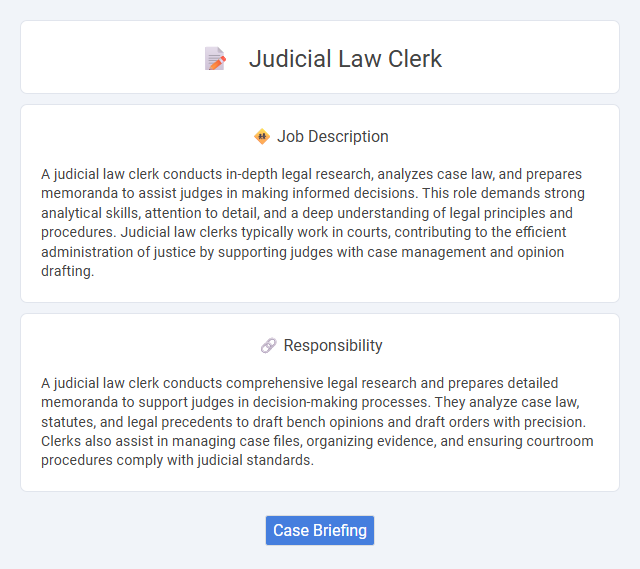
A judicial law clerk conducts in-depth legal research, analyzes case law, and prepares memoranda to assist judges in making informed decisions. This role demands strong analytical skills, attention to detail, and a deep understanding of legal principles and procedures. Judicial law clerks typically work in courts, contributing to the efficient administration of justice by supporting judges with case management and opinion drafting.
Individuals with strong analytical skills and a keen interest in legal research are likely to find a judicial law clerk position well-suited to their abilities. Those who can handle high-pressure environments and maintain attention to detail might thrive in this role, given the demands of meticulous case review and drafting legal opinions. People who prefer collaborative work may also find this job suitable, as clerks often work closely with judges and legal teams.
Qualification
Judicial law clerks typically require a Juris Doctor (JD) degree from an accredited law school and strong academic credentials, often within the top 10-20% of their class. Exceptional legal research, writing skills, and prior experience through internships or clerkships are highly valued by appellate or district court judges. Proficiency in analyzing complex legal issues and familiarity with courtroom procedures enhance a candidate's qualifications for securing competitive clerkship positions.
Responsibility
A judicial law clerk conducts comprehensive legal research and prepares detailed memoranda to support judges in decision-making processes. They analyze case law, statutes, and legal precedents to draft bench opinions and draft orders with precision. Clerks also assist in managing case files, organizing evidence, and ensuring courtroom procedures comply with judicial standards.
Benefit
Judicial law clerk positions likely offer the benefit of gaining in-depth insight into judicial decision-making processes, which can significantly enhance legal research and writing skills. These roles probably provide unparalleled networking opportunities with judges and legal professionals, improving future career prospects. The experience gained as a law clerk may increase the probability of securing prestigious positions in law firms or academia.
Challenge
A judicial law clerk job likely presents significant challenges due to the high volume of complex legal research and writing required to assist judges in making informed decisions. The position probably demands strong analytical skills and the ability to interpret intricate legal issues under strict deadlines. Candidates may also face the pressure of maintaining impartiality and confidentiality while managing a diverse caseload.
Career Advancement
A judicial law clerk gains invaluable experience by conducting legal research, drafting opinions, and assisting judges with case management, which significantly enhances analytical and writing skills. This role serves as a critical stepping stone for careers in litigation, appellate practice, or judicial appointments, often leading to positions at top law firms, government agencies, or academia. Clerkships are highly regarded in the legal industry and provide networking opportunities that facilitate rapid career advancement and specialization.
Key Terms
Case Briefing
Judicial law clerks play a critical role in case briefing by analyzing court opinions, extracting key facts, legal issues, and rulings for judicial review. Effective case briefing involves summarizing complex legal arguments succinctly to assist judges in decision-making processes. Mastery of statutory interpretation and precedent application is essential to ensure accurate and thorough case documentation.
 kuljobs.com
kuljobs.com